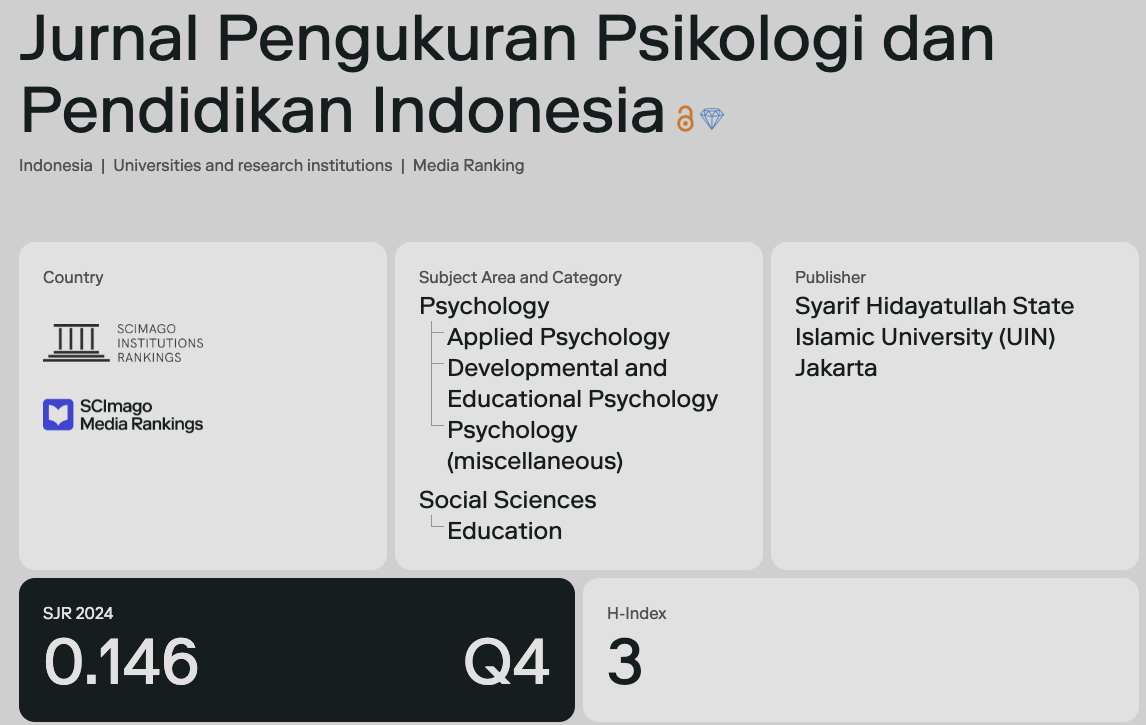The Effect Of Five-Factor Model Ofpersonality And Religiosity Toward Adolescents’s Resilience Whoose Parents Are Divorced
DOI:
https://doi.org/10.15408/jp3i.v6i1.8149Keywords:
Kepribadian, Religiusitas, Resiliensi, Remaja, Perceraian orangtuaAbstract
The objective of this study is to examine the effect of five-factor model of personality (agreeableness, conscientiousness, emotional stability, intellect, surgency) and religiosity (forgiveness, general religiosity, god as judge, involved god, social religiosity, thankfulness, unvengefulness) toward adolescents’s resilience whoose parents are divorced in Indonesian. Samples are 158 adolescents whoose 15-22 years old and had a parental-divorced experience. Sampling technique is convenience sampling. The scales are modified from Resilience Quotient, Mini-IPIP, and Religiosity Scale from Kendler. The validity of the scales are examined by confirmatory factor analysis (CFA). The data is analized by multiple regression analysis technique. The result of this study shows that five-factor model of personality and religiosity have significant effect toward the resilience among adolescents. The minor hypothesis examination shows that only intellect model of personality and general religiosity which have significant effect toward dependent variable. We hope that the implication of this study could be re-examined an developed in the next study. Therefore, for the next study, we suggest to use bigger sample size and participate other independent variables such as self-esteem, hopelessness, stress-coping, loneliness, hope, social support, optimism, demografic fartors, etc.
Penelitian ini bertujuan untuk mengetahui pengaruh model kepribadian lima faktor (agreeableness, conscientiousness, emotional stability, intellect, surgency) dan religiusitas (forgiveness, general religiosity, god as judge, involved god, social religiosity, thankfulness, unvengefulness) terhadap resiliensi remaja korban perceraian di Indonesia. Sampel penelitian berjumlah 158 remaja berusia 15-22 tahun yang memiliki pengalaman atas perceraian kedua orangtuanya. Teknik pengambilan sampel yang digunakan adalah convenience sampling. Peneliti memodifikasi alat ukur Resilience Quotient, Mini-IPIP, dan Religiusitas Kendler. Uji validitas alat ukur menggunakan teknik Confirmatory Factor Analysis (CFA). Analisis data menggunakan teknik analisis regresi berganda. Hasil penelitian menunjukkan bahwa ada pengaruh yang signifikan dari model kepribadian lima faktor dan religiusitas terhadap resiliensi subjek penelitian. Hasil uji hipotesis minor yang menguji pengaruh masing-masing variabel bebas terhadap variabel terikat menunjukkan bahwa hanya model kepribadian intellect dan general religiosity yang memberikan pengaruh terhadap resiliensi subjek penelitian secara signifikan. Peneliti berharap implikasi dari penelitian ini dapat dikaji kembali dan dikembangkan pada penelitian selanjutnya. Adapun untuk penelitian selanjutnya, disarankan agar menggunakan jumlah sampel yang lebih besar dan melibatkan berbagai variabel bebas lainnya yang juga berkaitan dengan resiliensi seperti self-esteem, hopelessness, coping stress, loneliness, harapan, dukungan sosial, optimisme, faktor demografi, dan lain sebagainya.
References
Altundag, Y. & Bulut, S. (2014). Prediction of resilience of adolescents whose parents are divorced. Psychology, 5, 1215-1223. http://dx.doi.org/10.4236/psych.2014.510134.
Berk, L. E. (2004). Infants, Children, and Adolescents (Fifth Edition). Boston: Pearson Education, Inc.
Chaplin, J.P. Dictionary of psychology. Kamus lengkap psikologi. Kartini Kartono (terj). 2011. Jakarta: PT. Raja Grafindo Persada.
Chen, J. D. & George, R. A. (2005). Cultivating resilience in children from divorced families. The Family Journal: Counseling and therapy for couples and families, 13, (4), 452-455. DOI: 10.1177/1066480705278686.
Donellan, M. B., Oswald, F. L., Baird, B. M., & Lucas, R. E. (2006). The Mini-IPIP scales: Tiny-yet-effective measures of the big five factors of personality. Psychological Assessment, 18, (2), 192-203. DOI: 10.1037/1040-3590.18.2.192.
Dumont, F. (2012). A History of Personality Psychology: Theory, science, and research from hellenism to the twenty-first century. New York: Cambridge University Press.
Fayombo, G. (2010). The relationship between personality traits and psychological resilience among the Caribbean adolescents. International Journal of Psychological Studies, 2, (2), 105-116.
Feldman, R. S. (2012). Life Span Development: A topical approach. New Jersey: Pearson Education, Inc.
Fetzer, J. E. (1999). Multidimensional Measurement of Religiousness/Spirituality for Use in Health Research: A report of the fetzer institute/national institute on aging working group. Kalamazoo: Fetzer Institute.
Glock, C.Y., & Stark, R. (1968). American Piety: The nature of religious commitment. Berkeley: University of California Press.
Goldberg, L. R. (1992). The development of markers for the big-five factor structure. Psychological Assessment, Vol. 4, No. 1, 26-42.
Grotberg, E. H. (1995). The International Resilience Project: Research and application. ERIC Document. ED 423 955. Civitan International, Birmingham, AL.
Hill, R. (1998). What sample size is enough in internet survey research. Journal of Interpersonal Computing and Technology, 6, 1-10.
Huey, S. J. & Weisz, J. R. (1997). Ego control, ego resiliency, and the five-factor model as the predictors of behavioral and emotional problems in clinic-referred children and adolescents. Journal of Abnormal Psychology, 106, (3), 404-415.
Iqbal, M. (2011). Hubungan antara Self-Esteem dan Religiusitas terhadap Resiliensi pada Remaja di Yayasan Himmata. Skripsi. Fakultas Psikologi UIN Jakarta.
John, O. P. & Srivastava, S. (1999). The Big-Five Trait Taxonomy: History, measurement, and theoritical perspectives. Berkeley: University of California Press.
Karatas, Z. & Ersoy, M. A. (2011). Self-esteem and hopelessness, and resiliency: An exploratory study of adolescents in Turkey. International Education Studies, 4, (4), 84-91. doi:10.5539/ies.v4n4p84.
Kelly, J. B. & Emery, R. E. (2003). Children’s adjustment following divorce: Risk and resilience perspectives. Family Relations, 52, 352–362. DOI: 10.1111/j.1741-3729.2003.00352.x.
Kendler, K. S. Liu, X. Q., Gardner, C. O., McCullough, M. E., Larson, D., & Prescott, C. A. (2003). Dimensions of religiosity and their relationship to lifetime psychiatric and substance use disorder. Am J Psychiatry, 160, 496-503. http://ajp.psychiatryonline.org
Klohnen, E. C. (1996). Conceptual analysis and measurement of the construct of ego-resiliency. Journal of Personality and Social Psychology, 70, (5), 1067-1079.
Linquanti, R. (1996). Using Community-Wide Collaboration to Foster Resiliency in Kids: A conceptual framework. ERIC Document. ED 353 666. Departement of Education, Washington DC.
McCrae, R. R. & John, O. P. (1991). An Introduction to The Five-Factor Model and Its Applications. Baltimore: Gerontology Research Center.
McCubbin, L. (2001). Challenges to The Definition of Resilience. ERIC Document. ED 458 498. Paper presented at the Annual Meeting of the American Psychological Association.
Mischel, W., Shoda, Y. & Smith, E. R. (2004). Introduction to Personality: Toward an integration. Seventh Edition. New York: John Wiley & Sons, Inc.
Papalia, D. E., Olds, S. W., & Feldman, R. D. Human development (ed 10th). Perkembangan manusia (buku 2). Brian Marwensdy (terj). 2009. Jakarta: Penerbit Salemba Humanika.
Pertiwi, M. (2011). Dimensi Religiusitas dan Resiliensi pada Residen Narkoba di BNN Lido. Skripsi. Fakultas Psikologi UIN Jakarta.
Pervin, L. A., Cervone, D., & John, O. P. Personality: Theory and research (9th edition). Psikologi kepribadian: Teori dan penelitian (Edisi kesembilan). A. K. Anwar (terj). 2010. Jakarta: Kencana.
Rakhmat, J. (2003). Psikologi Agama. Jakarta: PT. Raja Grafindo Persada.
Reivich, K. & Shatte, A. (2002). The Resilience Factors: 7 Essential skills for overcoming life’s inevitable obstacles. New York: Random House, Inc.
Rodgers, K. B. & Rose, H. A. (2002). Risk and resilience factors among adolescents who experience marital transitions. Journal of Marriage and Family, 64, 1024-1037.
Rosalina, M. P, Pudjiati, S. R., & Aswanti M. (2013). Kontribusi Spiritualitas dan Religiusitas terhadap Resiliensi Keluarga pada Mahasiswa dengan Latar Belakang Keluarga Miskin. Skripsi. Fakultas Ilmu Budaya Universitas Indonesia.
Santrock, J. W. Adolescence (Eleventh edition). Remaja (Edisi kesebelas, jilid 1). Benedictine Widyasinta (terj). 2007. Jakarta: Penerbit Erlangga.
Semestha, B. R. (2015). Pengaruh Self Esteem dan Dukungan Sosial terhadap Resiliensi Mantan Pecandu Narkoba. Skripsi. Fakultas Psikologi UIN Jakarta.
Shaughnessy, J. J., Zechmeister, E. B., & Zechmeister, J. S. Research Methods in Psychology. Metodologi Penelitian Psikologi (Edisi Ketujuh). Helly Prajitno Soetjipto (terj). 2007. Yogyakarta: Pustaka Pelajar.
Sukoco, D. (2017). Pengaruh Optimisme dan Religiusitas terhadap Resiliensi Pengungsi Somalia. Skripsi. Fakultas Psikologi UIN Jakarta.
Suryaman, M. A., Stanislaus, S., & Mabruri, M. I. (2013). Pengaruh religiusitas terhadap resiliensi pada pasien rehabilitasi narkoba yayasan rumah damai semarang. Journal of Developmental and Clinical Psychology, 2, (1), 14-18. ISSN 2252-6358. http://journal.unnes.ac.id/sju/index.php/dcp
Umar, J. (2012). Confirmatory Factor Analysis: Bahan Ajar Perkuliahan. Fakultas Psikologi UIN Jakarta.
Wardani, T. A. (2014). Pengaruh Harapan dan Coping Stress terhadap Resiliensi Caregiver Kanker. Skripsi. Fakultas Psikologi UIN Jakarta.








